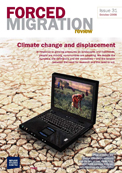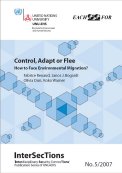(AlertNet) December 5, 2011 – Climate impacts such as worsening droughts, flooding, storm surges and sea level rise could displace tens of mill
ions of people by mid-century, scientists predict. But national and international rules governing resettlement of forced environmental migrants, and how they will be treated under the law, remain at a worryingly early stage, migration experts said at the U.N. climate talks in Durban.
“This risk, while recognised, has been inadequately dealt with by the international community,” admitted John Crowley, who heads the ethics of science and technology section at UNESCO, the body that currently chairs the Global Migration Group, a U.N. interagency group on migration issues.
Under today’s international law, “climate refugees” as a category are not formally recognised, and as such they have no right to asylum or other assistance. But an agreement at the U.N. climate summit in Cancun last year for the first time urged countries to accept that “climate change-induced displacement, migration and planned relocation” should be considered in plans to adapt to climate change.
That may open the door to migration costs being funded under the emerging Green Climate Fund, which is expected to disperse a promised $100 billion a year, starting in 2020, for climate adaptation and emissions reduction efforts in the world’s most vulnerable nations, said Koko Warner, an expert on environmental migration issues at the U.N. University.
Still, planning for predicted large-scale migration as a result of climate impacts remains preliminary, particularly regarding the politically perilous issue of migration across national borders.
Lack of preparation doesn’t mean migration won’t happen, however, experts warned.
“In some countries, there is no space (to resettle migrants), some countries might even go down under the water (and) in others, population pressure is so high that people cannot move (elsewhere in the country),” noted Qazi Kholiquzzaman Ahmad, a Bangladeshi economist and contributing author to several Intergovernmental Panel on Climate Change (IPCC) reports.
“Therefore, it’s extremely important we find ways of moving them out of the country and into regional countries if possible, or into countries where the number of people is small and there is huge land area,” he said. He admitted that “this is a difficult subject”.
One particular difficulty in dealing with climate-induced migration is that much of it is likely to be gradual. In many cases, it is predicted to be the result of an increasing burden of problems – poor harvests, bad weather, insufficient income – that
make it difficult for families to stay in their homes, rather than the result of a single disaster, something international agencies are more practiced at addressing.
“We are good at emergency response but bad on progressive, gradual phenomenon,” UNESCO’s Crowley said. “And climate change will be largely a progressive, gradual phenomenon. There won’t be anything to launch an appeal for, no specific event. There will just be growing pressure to migrate.”
Migration Needs To Be An Option
Keeping families in their homes as long as possible, through measures like promoting crops more tolerant of extreme weather, or better rainwater harvesting techniques, will be vital, the experts said. But there may also be some ways of helping those who have no choice but to leave.
First is to recognise migration as an effective kind of adaptation in some circumstances, rather than a failure of adaptation.
“Migration isn’t necessarily a bad thing. We have to recognise migration as an adaptation strategy, and make it an option available to the most vulnerable,” Crowley said.
But migration also needs to be carefully planned and managed to ensure migrants don’t end up becoming even more vulnerable,
by moving to flood-prone urban slums, for instance, or provoking conflict with their new neighbours, he said.
That may require reworking government safety net programmes to direct money to families displaced by climate pressures, or carrying out land reform to effectively settle landless people.
Changing immigration laws will also be important. Australia, for example, has a new visa category to accommodate displaced people from the region, experts said.
But many nations have steadfastly resisted giving environmental migrants refugee status.
“The problem with refugees is they have a claim to asylum. That’s why states are reluctant to expand the (refugee) regime,” Crowley said.
What’s worth remembering, experts say, is that migration usually happens as a last resort, to families who would prefer to remain where they are.
“People want to stay home. They have a profound spiritual tie to their homeland. But if they can’t, we need to make sure they can migrate in safety and dignity,” Warner said.
Source: AlterNet



